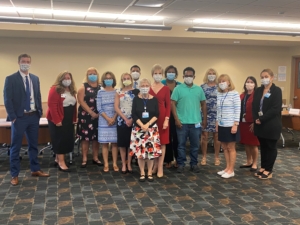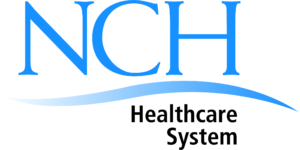NCH’s Patient Family Advisory Council Makes a Difference
Council Aims to Improve Hospital Experience for Both Patients and Their Families

PFAC Advisory Council
If you’ve ever had a family member who required hospitalization, you know that the experience can be just as difficult for loved ones as it can be for the patient. Not only are family members often left to navigate an often-confusing maze of medical jargon, hospital protocols and processes, they’re often attempting to do so while maintaining a job, family and other life responsibilities. The emotional strain can often be overwhelming.
Recognizing the challenges faced by patient family members, NCH created the Patient Family Advisory Council (PFAC) in January 2021 to improve communications between hospital staff and family members and to help NCH in its ongoing mission to deliver exceptional patient care.
“Illness of an individual doesn’t just affect that one person; you have a ‘sick’ and frightened family as well,” explained Amanda Smith, NCH Director of Guest Relations and PFAC staff co-chair. “PFAC looks at ways to ensure that the family is ‘seen’ and looked after with the same sensitivity that we provide our patients.”

Kristin Mascotti, MD, CMO, NCH Healthcare System
The PFAC initiative was formed by NCH executive sponsors Kristin Mascotti, MD, Chief Medical Officer, and Carlos Quintero, MD, Chief Quality Officer. Their vision was to create a diversified committee with representatives from patients, families, hospital staff and executives, that could explore issues affecting patient care from several different viewpoints – and affect change when warranted.
Smith says that the council has already made changes in the hospital, and through PFAC, they have found an effective way to make improvements with input from everyone who is impacted.
“Some items that we have worked on include brainstorming fall prevention strategies in patients’ rooms, reviewing materials brought by NCH staff for feedback, enhancing the inpatient platform with bedside solutions, and selecting the best patient-use trays for food delivery,” explained Smith.
The council serves as a place for patients and their families to voice concerns arising from personal experiences with the ear of hospital staff and executives who are in a position to authorize changes. The committee also reviews the results of patient surveys to identify areas that may be in need of improved patient and family communication and provides input on protocols and processes to improve clinical and personal outcomes for both patients and their caregivers.
The PFAC agenda also addresses concerns initiated by NCH staff, and toward that end, the advisors attend rounds with executives to various units and carefully listen to the issues raised by healthcare staff. They also bring awareness of the role of PFAC to the NCH staff.

Amanda Smith
PFAC includes Sandra Lee Buxton and Sunny McCowan, advisor co-chairs, and Amanda Smith, staff co-chair. Nine committee advisors are distributed among caregivers, family, and former patients, and are supported by executives and rotating ancillary staff members.
“Our PFAC committee members have diverse backgrounds and personal experiences as a patient or as a caregiver of a hospitalized patient,” explained Buxton. “This information is important to the process, and each committee member is respected and realizes that their voice is heard. Team members also recognize that expressing their life experiences is pivotal to achieving change, streamlining services, and removing barriers to satisfaction.”
Periodically, the NCH executives receive a PFAC report communicating strategies and recommendations to improve the healthcare experience. For more information, or to learn about the application process, email the Department of Guest Relations at PFAC@nchmd.org or call (239) 624-3410.
Ways in which PFAC advisors impact change:
- IDENTIFY areas for improvement by sharing experiences, issues concerning different functions, and reviewing patient survey results
- INFLUENCE change by participating in staff, patient and family education and by serving as a representative on various committee decisions
- IMPROVE both clinical and personal outcomes for patients and their caregivers
PFAC involvement as an advisor includes:
- Commitment to serve as the advisor and voice of the NCH patient and family
- Commitment to 10 meetings in a calendar year (attend at least 8) Availability of three to four hours per month between meetings and project work
- Participation in special events or actives to raise awareness about PFAC
To become a PFAC advisor, you must:
- Be coping well with your hospital experiences
- Be willing to talk about your experiences and effectively share insights and information
- Demonstrate a passion for improving health care for others
- Have the ability to listen well, respect the perspectives of others, interact with various individuals, and work in partnership
- Enjoy working with others, show a positive outlook on life, and bring a sense of humor




Leave a Reply
Want to join the discussion?Feel free to contribute!